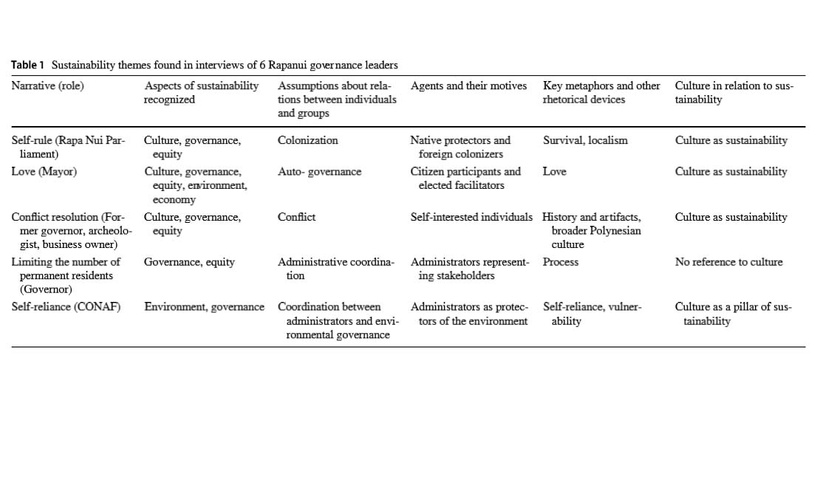The role of culture in sustainable communities: the case of Rapa Nui (Easter Island, Chile); this recent case study of Rapa Nui Easter island informs how cultural heritage impacts the understanding of sustainability.
Rapa Nui is a tiny island (yes, that Easter island you have seen all over the internet) with a recent extreme rise in tourism that strains the already scarce resources. The island has unique cultural and archaeological heritage and natural resources, with 43% of the land being part of the Rapa Nui National Park. Over tourism, while financially beneficial, created critical threats to its sustainability.
On the island, there is archaeological evidence of systems that shaped the cultural heritage of Rapa Nui. The arrival of Europeans in 1772 severely impacted the sociocultural structure of the island, echoing to this day.
The island administration is part of Chile, with almost half of the population identifying as Rapanui descendent. The island is far from the mainland and thus called for local management of the park to address sustainability, which, following strenuous progress, led to the implementation of an organisation composed of native Rapanui families. The organisation’s implementation is in three phases, due to complete in 2025, and will be responsible for the sustainable management of the island’s cultural and natural resources.
The views between administrators and the community often differ on the topic of sustainability. The paper explores in detail the relationship of culture and cultural affiliations with sustainability, breaking down into pillars:
- culture as something to be sustained
- culture as a mechanism for sustainability
- culture as a sustainability-focused system
The researchers conducted interviews with key stakeholders to identify the perceptions of sustainability in Rapa Nui and the steps to achieve it. The cultural practices and affiliations of the community remarkably inform their perspective, illustrated in the table below.

©The role of culture in sustainable communities: the case of Rapa Nui (Easter Island, Chile), Springer Nature
The table offers a pivotal observation that the environment is not a defining factor of sustainability for the Rapanui, unlike the “western” view where sustainability and environment are interlinked. For Rapa Nui sustainable living on a small island equals cohesion and peace.
“Living sustainably on a small island requires peace and harmony as much as the sustainable use of natural resources (Jucker 2014). Unlike virtually the rest of the world, in the not-too-distant past, members of the Rapa Nui community could not choose to leave their community in search of different living conditions or to flee conflict. Under these circumstances, the aspects of sustainability that make it possible for people to live in relative harmony—governance, culture, and equity—are likely to persist relative to options that favor conflict and group-level aggression.”
Rapa Nui teaches us that sustainability and culture are one and the same, developing an alternative management structure. In Europe, only recently cultural heritage became part of the Green-deal. Cultural heritage, especially intangible practices, often call for harmonious living with the environment and community. Culture is, in fact, an agent of sustainability instead of just another thing to sustain. This case study was particularly intriguing as the conceptual takeaways can inform the topic and actions for other communities worldwide.
I want to learn more:
The role of culture in sustainable communities: the case of Rapa Nui (Easter Island, Chile)[reserachgate] by Pamela A. Mischen and Carl Philipp Lipo, or available at Springer.
East Polynesian Islands as Models of Cultural Divergence: The Case of Rapa Nui and Rapa Iti by Robert J. DiNapoli, Alex E. Morrison, Carl P. Lipo, Terry L. Hunt & Brian G. Lane
Opinion: Endogenizing culture in sustainability science research and policy, by M. Caldas, Matthew R. Sanderson, Martha Mather, Melinda D. Daniels, Jason S. Bergtold, Joseph Aistrup, Jessica L. Heier Stamm, David Haukos, Kyle Douglas-Mankin, Aleksey Y. Sheshukov, and David Lopez-Carr
PS: “just shower thoughts” the roman trend of “Man-over nature” really messed up sustainability- wait should that be part of the experience of cultural identity?-

